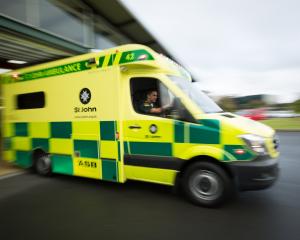
Cabinet is still considering the details of the buy-back scheme, which was estimated to cost the Government up to $200million, but Mr Peters said the funding would come from outside existing department base lines.
However this morning, Peters told RNZ that the full cost could be much higher than that.
"It's better to prepare for the worst and think of the upper limit. It could cost – and this is an extravagant statement but it may well be true – it could cost up to $300 million to set what is wrong, right."
"It's going to cost us a penny, but that's what has to be done now,'' Mr Peters said.
"We're going to have to find either savings somewhere else or increased revenue, but whatever it is, that is not the point. It is to treat people fairly who thought they had a legal entitlement to a weapon that's now going to be outlawed.''
People with military-style semi-automatic (MSSA) weapons and assault rifles have until the end of September to hand them over to police or face five years' jail.
Police Minister Stuart Nash has issued a stern warning to gangs who have said they will keep their MSSAs: hand them in or face jail.

The Arms (Prohibited Firearms, Magazines and Parts) Amendment Bill had been introduced to Parliament and would have its first reading today, Acting Prime Minister Winston Peters and Mr Nash announced yesterday.
It will be reported back from select committee on April 8 following a shortened period of public consultation, and come into force on April 12.
The Bill is expected to pass with cross-party support, though Act leader David Seymour has yet to decide if he will vote for it.
It will outlaw MSSA weapons and assault rifles, although there will be exemptions for guns commonly used by farmers for pest control, as well as hunters.
The Mongrel Mob said at the weekend that it would not hand over MSSAs, but Mr Nash pointed to the new penalty of five years' jail for possession: "My advice to the gangs is, 'Hand your weapons back'.''
Other new offences for using MSSAs or shotguns with more than five rounds include:
• Up to 10 years' jail for resisting arrest.
• Up to seven years' jail for use in a public place; presenting them at another person; carrying them with criminal intent or possession while committing an offence that has a maximum penalty of three years or more.
• Up to five years' jail for importing, possessing, or supplying or selling, or using a banned part to convert a firearm into an MSSA.
The Government's timeline has been criticised as rushed. A 14,000-strong petition to Parliament calls for a more thorough process for public consultation.
Mr Nash defended the Government's haste.
"Everyone I have spoken to, be they hunters, farmers ... have said you do not need MSSAs or an assault weapon to go hunting or do farm business. These are guns designed to kill people.
"We don't think we're moving fast in this at all.''
The amnesty to the end of September means people who own guns or gun parts that will be illegal can surrender them to police without fear of prosecution.
About 200 firearms have already been handed over to police, and about 1400 calls have been made to the police 0800 311-311 line.
The Bill also bans certain parts that enable weapons to become MSSAs or assault rifles, including bump stocks, free-standing pistol grips and silencers, and magazines holding more than five rounds for a shotgun.
Possessing or selling a banned part could mean a jail term of up to two years.
The Governor-General, through Order in Council, will ban types of military ammunition, including possibly armour-piercing ammunition.
A second amendment to the Arms Act will be introduced later this year and go through a full select committee process, Mr Nash said.
For that Bill, Cabinet will consider issues including whether a national register of firearms is needed, the vetting process for a "fit and proper'' person to obtain a gun licence, and the police inspection and monitoring regime, including rules around storage.
Gun reform
The prohibitions
- Semi-automatics and MSSAs.
- Shotguns with detachable magazines or internal magazines (more than five rounds).
- Magazines capable of holding more than 10 cartridges.
- Any component of a prohibited firearm, or that can enable a firearm to be used as a semi-automatic or fully automatic weapon.
- Certain types of military ammunition.
Exempt
- Semi-automatic .22 firearms (magazine holding no more than 10 rounds).
- Semi-automatic and pump action shotguns (non-detachable, tubular magazine holding no more than five rounds).
- Specially licensed dealers, bona fide collectors, museum curators and firearms used during dramatic productions.
- Authorised pest controllers.
- Police and Defence Force personnel.
Comments
The reality of the situation is that it is already illegal for gang members to own guns as they, and anyone who associates with gang members, cannot legally hold a firearms license.
In 2016 there were 131 people charged with illegal possession of a firearm. Only twelve of these were actually given prison terms. The shortest was 30 days. The longest was 90 days, and the average was 44 days. But since we have this wonderful idea of CONCURRENT sentencing in NZ the jail terms were irrelevant.
Of the other 119 offenders, they received an array of minimal home detention periods, a few dollars a week reduction in their benefit, and (most likely) restricted television viewing hours.
There is ZERO incentive for criminals to leave their guns at home when they go out to commit crimes.
For all Winston’s efforts donning his false teeth and growling at the gangs, he may as well go back to Turkey for the week.
We need the abolishment of CONCURRENT sentencing and a judiciary that will take their obligations to protect society from armed offenders more seriously than their ambitions to be seen as social workers.











